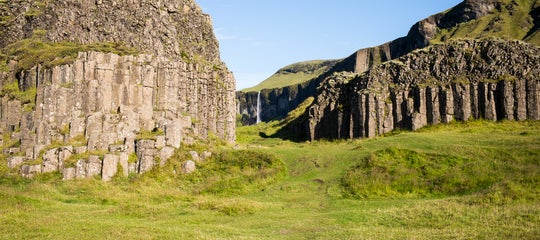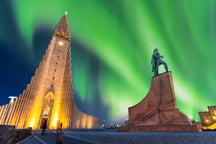
Iceland has one of the strongest job markets in Europe. If you’ve already explored the country through vacation packages and fallen in love with its landscapes and culture, you may now be thinking about moving to Iceland for a more permanent experience.
Americans and qualified applicants from outside the European Economic Area (EEA) can use this guide to prepare effectively and begin their career in Iceland with confidence. Working in Iceland gives you the chance to join a modern, inclusive, and well-balanced workplace.
Read on to learn what you can do to work in Iceland successfully.
Key Takeaways
-
Foreigners can work in Iceland, but the process differs. EEA and EFTA citizens can work without a permit for up to 90 days, while non-EEA citizens need both a work permit and a residence permit.
-
English is widely used in many workplaces, but learning Icelandic helps with long-term career growth and integration.
-
The average full-time work week is around 40 hours, with strong worker protections and an emphasis on work-life balance.
-
Salaries in Iceland are among the highest in Europe, though living costs, especially in Reykjavik, can also be high.
-
Applying for jobs requires a concise CV, a clear cover letter, and attention to Icelandic hiring norms, such as including a photo and a list of references.
-
The Icelandic work visa process requires employer sponsorship and approval from the Directorate of Labour and the Directorate of Immigration.
Can Foreigners Work in Iceland?
 Yes, foreigners can work in Iceland. According to the European Employment Services (EURES), non-Icelandic nationals made up about 19 percent of the country’s workforce in 2023.
Yes, foreigners can work in Iceland. According to the European Employment Services (EURES), non-Icelandic nationals made up about 19 percent of the country’s workforce in 2023.
That includes 11.8 percent from other European Union (EU) and EEA countries and 7.7 percent from outside the EU and EEA. However, the rules for working in Iceland differ for EEA citizens and non-EEA citizens.
EEA/EFTA Citizens
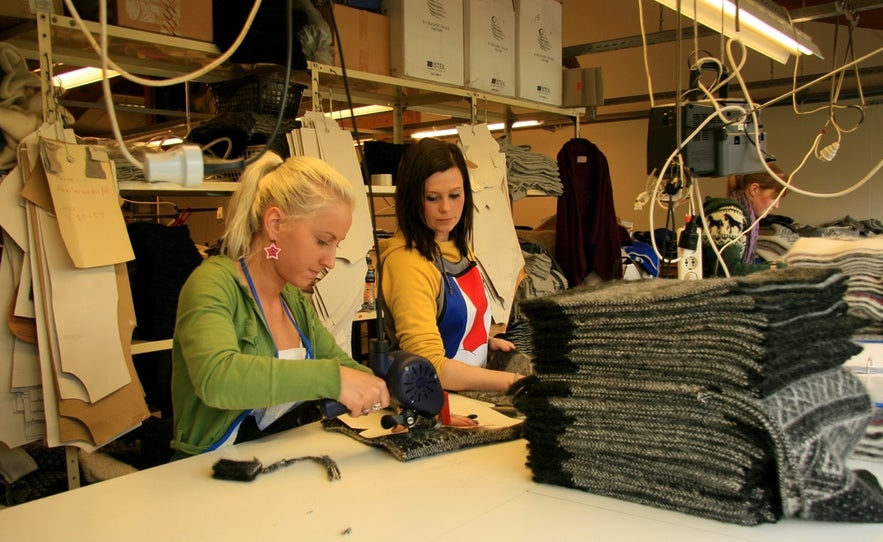 If you are a citizen of a country within the EEA or the European Free Trade Association (EFTA), you can live and work in Iceland freely for up to 90 days. You do not need to apply for a work or residence permit before starting a job.
If you are a citizen of a country within the EEA or the European Free Trade Association (EFTA), you can live and work in Iceland freely for up to 90 days. You do not need to apply for a work or residence permit before starting a job.
Once you have been in the country for more than 90 days, you must register your residence with local authorities and obtain a national ID number (kennitala). This number is required for everyday needs such as receiving salary payments, paying taxes, and accessing healthcare.
Non-EEA Citizens (Including Americans)
 If you are from outside the EEA or EFTA region, such as the United States, Canada, or the United Kingdom, your process requires formal approval to work. You must first receive a confirmed job offer from an Icelandic employer before you can apply for permission to live and work in Iceland.
If you are from outside the EEA or EFTA region, such as the United States, Canada, or the United Kingdom, your process requires formal approval to work. You must first receive a confirmed job offer from an Icelandic employer before you can apply for permission to live and work in Iceland.
What It’s Like To Work in Iceland
 Now that you know foreigners can work in Iceland, the next step is understanding what daily work life is really like. Here are a few key insights before you start applying, so you can decide if working and living in Iceland is right for you.
Now that you know foreigners can work in Iceland, the next step is understanding what daily work life is really like. Here are a few key insights before you start applying, so you can decide if working and living in Iceland is right for you.
The sections below cover average salaries, working conditions, and work culture. Together, they’ll help you set realistic expectations about working and living in Iceland.
Work Culture in Iceland
 The work culture in Iceland centers on equality, trust, and collaboration. Most workplaces are informal, and hierarchy is minimal. Managers are approachable, and employees are encouraged to share ideas openly.
The work culture in Iceland centers on equality, trust, and collaboration. Most workplaces are informal, and hierarchy is minimal. Managers are approachable, and employees are encouraged to share ideas openly.
Teamwork and reliability are important in Icelandic offices, and communication tends to be direct and practical. Punctuality is expected, but flexibility is also respected, especially when it comes to family and personal life.
Workplaces in Iceland also place strong emphasis on gender equality. Both men and women share equal career opportunities and parental leave benefits, supported by the country’s progressive labor policies.
Work Conditions in Iceland
 Working conditions in Iceland are among the best in Europe. The average full-time workweek is around 40 hours, and overtime is compensated or regulated by collective agreements. Workers are entitled to at least 24 days of paid vacation each year, along with several national holidays.
Working conditions in Iceland are among the best in Europe. The average full-time workweek is around 40 hours, and overtime is compensated or regulated by collective agreements. Workers are entitled to at least 24 days of paid vacation each year, along with several national holidays.
Labor unions play a major role in maintaining fair pay, workplace safety, and benefits across different industries. Most employees in Iceland are unionized, and agreements between unions and employers determine minimum wages and working standards.
Equality and inclusion are cornerstones of Icelandic labor practices. Gender pay gaps are closely monitored, and employers are required to promote diversity and equal opportunities.
Average Salaries in Iceland
 According to Statistics Iceland, the average regular monthly earnings in 2024 were 758,000 ISK (about 5,400 USD). But it’s good to note that earnings in Iceland vary depending on the profession.
According to Statistics Iceland, the average regular monthly earnings in 2024 were 758,000 ISK (about 5,400 USD). But it’s good to note that earnings in Iceland vary depending on the profession.
The highest salaries in Iceland typically go to those in medicine, law, finance, aviation, and senior management. They earn over 1.7 million ISK (around 13,300 USD) per month on average. Jobs in research, computing, and business services also rank among the country’s best-paid careers.
Meanwhile, positions in clerical work, childcare, and general service roles tend to offer more modest wages. For example, library clerks, laundry workers, and childcare employees earn between 573,000 and 605,000 ISK (roughly 4,500 to 4,700 USD) per month.
Cost of Living in Iceland
 Living in Iceland can be expensive, especially in Reykjavik. According to Living Cost, a single person’s average monthly expense is about 439,600 ISK (3,155 USD). Rent for a one-bedroom apartment typically costs around 268,000 ISK (1,927 USD), while food expenses average about 95,000 ISK (751 USD) per month for a family of 4.
Living in Iceland can be expensive, especially in Reykjavik. According to Living Cost, a single person’s average monthly expense is about 439,600 ISK (3,155 USD). Rent for a one-bedroom apartment typically costs around 268,000 ISK (1,927 USD), while food expenses average about 95,000 ISK (751 USD) per month for a family of 4.
Everyday essentials such as groceries, transportation, and utilities also come at a higher price than in many European countries. These costs are partly offset by Iceland’s strong wages and excellent public services, but living comfortably still requires careful budgeting.
Compared with the United States, overall living costs in Iceland are higher. Living Cost estimates that a single person in the U.S. spends about 350,600 ISK (2,516 USD) per month, with lower average rent and food prices.
Jobs in Iceland for Americans & Non-EEA Citizens
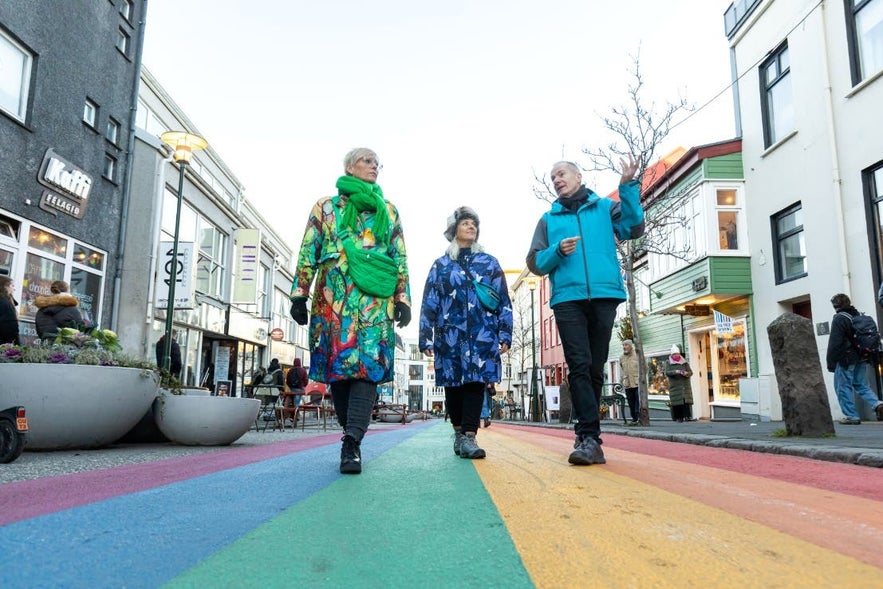 Now that you understand what it’s like to work in Iceland, we hope you feel motivated to explore jobs for Americans and other non-EEA citizens. The country continues to welcome skilled international professionals, offering opportunities in industries that rely on foreign talent.
Now that you understand what it’s like to work in Iceland, we hope you feel motivated to explore jobs for Americans and other non-EEA citizens. The country continues to welcome skilled international professionals, offering opportunities in industries that rely on foreign talent.
According to the Organisation for Economic Co-operation and Development (OECD), Iceland has a particularly high share of foreign workers in tourism, fishing, and construction. In addition, specialist jobs in design, computers, and data are highly valued.
English-Speaking Jobs in Iceland
 Icelandic is the official language and remains the main language used in local businesses and public-sector jobs. However, English is also widely spoken and often serves as the working language in companies that employ international staff or cater to global customers.
Icelandic is the official language and remains the main language used in local businesses and public-sector jobs. However, English is also widely spoken and often serves as the working language in companies that employ international staff or cater to global customers.
Because of this language mix, it is possible to find work in Iceland without speaking Icelandic. These positions are usually advertised in English, so checking job listings carefully will help you identify the right opportunities.
Where To Find Jobs in Iceland
 When you start your search for jobs in Iceland, it helps to know where to look. The country has a mix of reliable job search websites and recruitment agencies that connect local employers with international talent.
When you start your search for jobs in Iceland, it helps to know where to look. The country has a mix of reliable job search websites and recruitment agencies that connect local employers with international talent.
Top Job Search Websites in Iceland
 Iceland’s main job portals are easy to use and regularly updated with openings across all industries. Most allow you to sort by job type, location, and language, so you can focus on roles that fit your skills and experience.
Iceland’s main job portals are easy to use and regularly updated with openings across all industries. Most allow you to sort by job type, location, and language, so you can focus on roles that fit your skills and experience.
Some of the best options include:
-
Tvinna: Focuses on specialist roles related to design, computers, and data. You’ll find a strong mix of creative and technical positions in fields like UX, graphic design, software development, and marketing.
-
Alfred: Alfred is one of Iceland’s most popular job search platforms. It allows you to filter by industry, job type, and language, including an option to find jobs that don’t require Icelandic skills.
-
Vinnumalastofnun: This is the official Icelandic Labor Authority, listing openings across all sectors, from tourism and construction to healthcare and education. The site also features EURES job listings, which connect you to opportunities across the EEA.
-
Job: Offers a broad range of job listings in Iceland, including part-time, full-time, and temporary roles.
-
Storf: Compiles openings from various employers nationwide. You can search by profession or location, which is useful if you want to work in smaller Icelandic towns or outside Reykjavik.
Recruitment Agencies in Iceland
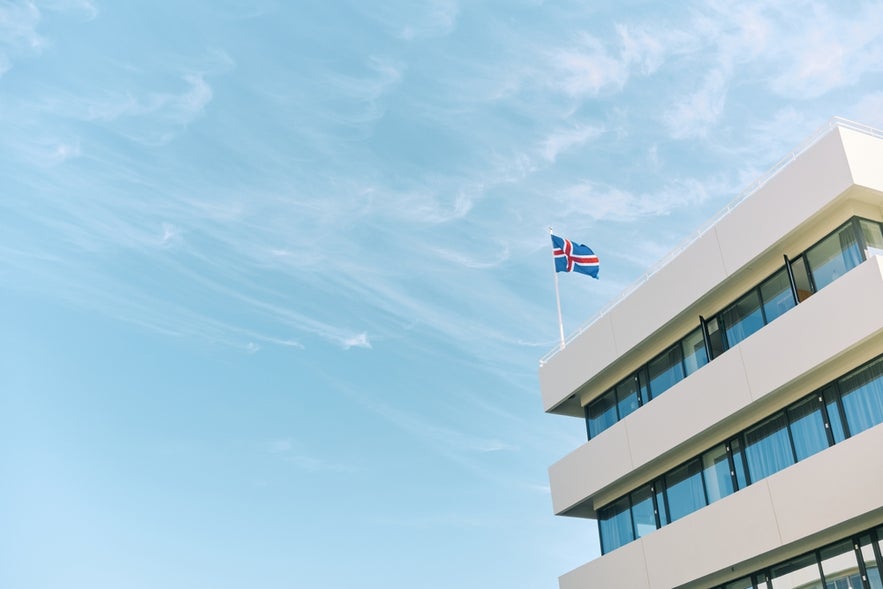 In Iceland, many large companies handle hiring through recruitment agencies, and not all openings are publicly listed. Contacting these agencies directly can give you access to unadvertised jobs that match your skills, experience, and language background.
In Iceland, many large companies handle hiring through recruitment agencies, and not all openings are publicly listed. Contacting these agencies directly can give you access to unadvertised jobs that match your skills, experience, and language background.
-
Intellecta: A well-established Icelandic recruitment agency that connects professionals and specialists with roles in senior management, strategy, and corporate services.
-
Geko: A hiring and people-strategy firm that works primarily with Icelandic companies in the technology and innovation sectors, offering recruitment and HR services.
-
Hagvangur: A recruitment and consulting service provider that supports both large corporations and public institutions in Iceland with executive and organisational staffing needs.
-
Human Resource Services (HRS): An Icelandic recruitment agency serving a wide range of clients.
-
Radum: A staffing and human-resources consultancy that fills roles across various industries.
Tips for Applying for Work in Iceland
 As a foreigner planning to work in Iceland, understanding how the local hiring process works will help you stand out. Here are some practical tips to improve your chances when applying for jobs in Iceland:
As a foreigner planning to work in Iceland, understanding how the local hiring process works will help you stand out. Here are some practical tips to improve your chances when applying for jobs in Iceland:
-
Build connections and reach out directly: Networking plays a big role in Iceland. Aside from recruitment agencies and public listings, you can contact employers directly by email to introduce yourself and express interest in potential openings.
-
Keep your CV and cover letter short and simple: Icelandic employers prefer straightforward applications. Limit your cover letter and CV to one page each. Focus on your experience, education, skills, why you want to work in Iceland, and how you can contribute.
-
Include a professional photo: Adding a small photo to your CV is common in Iceland and considered professional.
-
Provide reliable references: Employers often check references before hiring, so include up-to-date contact information of your previous supervisors or managers.
-
Mention your language skills: Most Icelanders speak excellent English, and many companies operate in English, especially in tourism, tech, and international business. However, showing interest in learning Icelandic can make a positive impression.
-
Respond quickly to messages: The hiring process in Iceland is usually fast. Reply to emails and calls within a day or two to show professionalism and genuine interest.
-
Be honest and direct during interviews: Communication in Icelandic workplaces is clear and straightforward. Interviews tend to focus on skills, experience, and availability. Be ready to discuss your relocation plans and legal right to work in Iceland.
Work Permits for Non-EEA Citizens
 You must have both a work permit and a residence permit before you can start working in Iceland. If you do not already have a residence permit, which is most often the case, it is the employer’s responsibility to apply for the work permit on your behalf.
You must have both a work permit and a residence permit before you can start working in Iceland. If you do not already have a residence permit, which is most often the case, it is the employer’s responsibility to apply for the work permit on your behalf.
The process typically begins once you have received a confirmed job offer from an Icelandic employer. The employer gathers all required documents and submits the work permit application to the Directorate of Labour.
Here are the main requirements for a work permit application in Iceland:
-
Completed application form for the appropriate category of work permit. The main categories include:
-
Expert knowledge: For foreign professionals with specialized skills not readily available in Iceland.
-
Shortage of labour: For positions in industries experiencing a shortage of local workers.
-
Athletes: For professional athletes or coaches joining Icelandic sports clubs.
-
Special circumstances: For specific cases that do not fit other categories, such as unique short-term projects.
-
Family reunification: For family members joining a relative who already holds a residence permit in Iceland.
-
Studying: For foreign students seeking part-time work while studying in Iceland.
-
Specialized employees under service contracts or collaboration agreements: For professionals employed under international business or research agreements.
-
-
Signed employment contract between you and your Icelandic employer.
-
Opinion from the relevant trade union, when required, to ensure that the employment terms meet Icelandic labor standards.
Additional documents may be required depending on the type of permit, and the Directorate of Labour may contact the employer or applicant if any information or paperwork is missing.
FAQs About Working in Iceland
Here are some of the most common questions foreigners ask about working in Iceland, along with clear answers to help you prepare before applying.
Can Americans work in Iceland?
Yes. Americans and other non-EEA citizens can work in Iceland. They must first secure a confirmed job offer and obtain both a work permit and a residence permit before starting employment.
Do I need to speak Icelandic to get a job in Iceland?
Not necessarily. Many workplaces, especially in Reykjavik and international industries like tourism and technology, use English as the main language. However, learning some Icelandic can improve your long-term prospects and help you integrate into the local culture.
What are the best times of the year to find work in Iceland?
Most seasonal jobs open up during Iceland’s summer months, when tourism is at its peak and businesses extend their operating hours. If you are looking for summer work, it’s best to start applying as early as February or March.
What is a decent salary in Iceland?
A decent monthly salary in Iceland starts around 400,000 ISK (approximately 3,100 USD), which generally covers basic living expenses and rent. Wages tend to be higher in Reykjavik and in specialized professions such as technology or engineering.
Is it hard to find a job in Iceland as a foreigner?
Competition can be moderate, but foreign applicants with relevant experience and language skills have good chances in the right sectors. Jobs in tourism, skilled labor, and technology remain the most accessible for non-Icelandic speakers.
Can I work in Iceland without a work permit?
If you are a citizen of an EEA or EFTA country, you can work in Iceland without a work permit for up to 90 days. However, if you are not from an EEA or EFTA country, you must have both a valid work permit and a residence permit before starting employment in Iceland.
How long does it take to get a work permit in Iceland?
Processing times vary. Most Iceland work visa applications take between six to twelve weeks from the date the Directorate of Labour receives all required documents. Delays can occur if the application is incomplete or if additional information is needed.
What To Do After You Get a Job in Iceland?
 By now, you’ve learned how to find job openings, prepare a strong application, and understand the work culture and permit requirements for working in Iceland. Once you secure a job offer, the next step is getting your paperwork approved and preparing for your relocation.
By now, you’ve learned how to find job openings, prepare a strong application, and understand the work culture and permit requirements for working in Iceland. Once you secure a job offer, the next step is getting your paperwork approved and preparing for your relocation.
After your offer is confirmed, take time to review your employment terms. You can then focus on arranging housing, registration, and other essentials for settling in the country. With the right preparation, you’ll be ready to start your new role and life in Iceland.
Are you planning to work in Iceland soon, or are you already living there? Share your questions or experiences in the comments. Your insights might help other readers start their journey with confidence.


